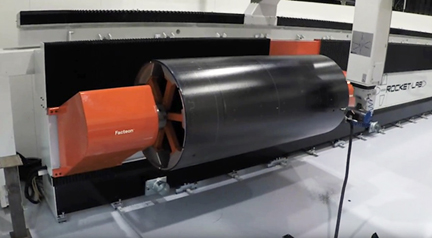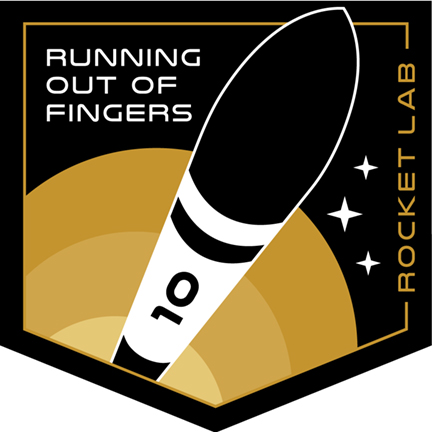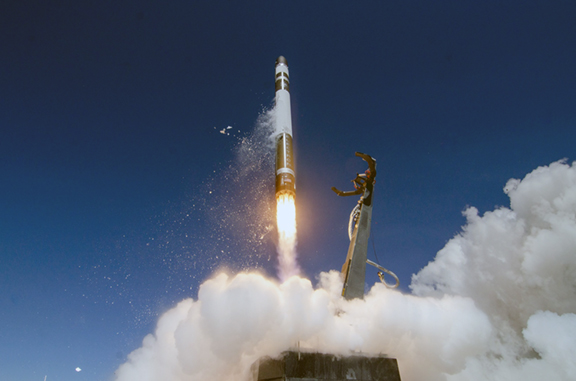
Rocket Lab has introduced ‘Rosie’ the rocket-building-robot to the company's manufacturing line, speeding up the production of Electron launch vehicles by more than 400 hours.
Until recently, Rocket Lab had been producing an Electron launch vehicle every 30 days. ‘Rosie’ the Robot will help bring Rocket Lab towards its goal of one Electron built and launched every seven days.

Rocket Lab's 'Rosie' robotic manufacturing system. Photo is courtesy of Rocket Lab.
The newly installed, custom-built, 140 sq/meter robot enables the precision machining of Electron’s carbon composite structures, including stage 1, stage 2, and the fairing. In only 12 hours, all marking, cutting, drilling, milling, and sanding, is completed on a full vehicle. ‘Rosie’ comprises a 3.5 meter by 16 meter 5-axis machining window coupled with a custom-built sixth rotary axis. The entire unit is large enough to house a bus, with room to spare, so it comfortably machines an entire 12m carbon-composite Electron first stage.

‘Rosie’ is the latest in a series of production, licensing, and infrastructure upgrades all targeted at boosting Electron production rates to meet a weekly launch cadence. In the past month, Rocket Lab has completed the installation of the launch mount and strongback at Launch Complex 2, Rocket Lab’s second orbital launch site, which will enable the first Electron launch from U.S soil in 2020. A new Range Control Facility has also been built at Launch Complex 1 to streamline mission operations, and the FAA has recently issued Rocket Lab with a 5 year Launch Operator License, enabling Rocket Lab to expedite pre-launch regulatory paperwork.
Work toward a reusable first stage for Electron is also underway, with Rocket Lab’s next mission featuring an upgraded booster to support recovery efforts. The launch window for the next mission, named ‘Running Out Of Fingers,’ is scheduled to open on November 25 and the mission features a first stage block upgrade.

The Electron launch of Rocket Lab's "As the Crow Flies" mission. Photo is courtesy of Sam Toms and Simon Moffatt.
Electron’s booster will include guidance and navigation hardware, including S-band telemetry and onboard flight computer systems, to gather data during the first stage’s atmospheric re-entry. The stage is also equipped with a reaction control system to orient the booster during its re-entry descent.
These new measures have been implemented with one goal in mind — frequent, reliable, and responsive launch for small satellites.
‘Rosie’ is automating machining tasks; however, human hands are still in high demand on the manufacturing teams at Rocket Lab’s Huntington Beach Headquarters and the company’s Production Complex in Auckland, New Zealand. More than 100 roles across manufacturing, test, and design are being recruited into the company over the next 12 months.
Rocket Lab’s Director of Production, Jamie France, said Rosie is the latest in a string of manufacturing upgrades designed to take the company from an Electron build every 30 days to one every seven days. A machine like this didn’t exist in the market, so Rocket Lab custom-built one that’s big enough for a bus to be parked within — this means building a rocket stage takes hours, not weeks or months.

